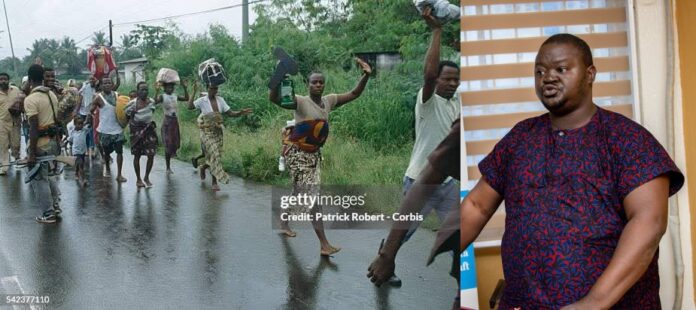—-Urges Gov’t to Move beyond Symbolism to Full Implementation of War and Economic Crimes Court
By David A. Yates Contributor
As Liberia continues to host state funerals and reburials for former presidents and officials lost to the country’s dark past, prominent media development practitioner Samukai V. Konneh has raised a compelling call for justice and accountability for the estimated 250,000 ordinary Liberians who died during the country’s brutal civil wars.
In a strongly worded statement released on his social media page over the weekend, Konneh praised the Boakai administration and the Liberian people for the “befitting burials and reburials” of late leaders, but warned that these ceremonial gestures risk becoming hollow if the government fails to fully implement the recommendations of the Truth and Reconciliation Commission (TRC), particularly the establishment and operationalization of a War and Economic Crimes Court
“We’ve given befitting burials and reburials to late presidents and state officials. Bravo to us as president, government and people,” Konneh acknowledged. “However, for the same reasons these late presidents and state officials were killed, an estimated 250,000 of our fellow citizens were killed.”
According to Konneh, while these funerals are meaningful, they must be matched by decisive steps toward accountability for the countless lives lost during Liberia’s prolonged civil conflict.
“We cannot celebrate the burials and reburials of less than 30 people while we ignore justice and accountability for 250,000 people,” he stressed. “Just as these burials and reburials are essential to reconciliation as contained in the TRC report, so too should justice and accountability for the death of 250,000 people. These people cannot die in vain.”
Konneh commended President Joseph Nyuma Boakai for establishing the Office for the War and Economic Crimes Court—seen as a major step forward in implementing the TRC’s long-delayed recommendations—but cautioned that more action is urgently needed.
“The president has taken the bull by the horn,” he said. “He cannot carry this bull half way. Noooo. He cannot do that and we cannot allow him to do that. He cannot be discretional about implementing the TRC.”
Highlighting concerns that the court’s administrative office is being underfunded and under-supported, Konneh expressed frustration at what he sees as performative action.
“Thanks for setting up the Office for War & Economic Crimes Court. While we commend this step, the truth is: setting up the office is just like picking a low-hanging fruit. It shouldn’t be about checking the box,” he said. “Let our president go beyond it. Make sure the needed fundings are available to make their work easier.”
Konneh revealed that staff within the office have reportedly gone months without salaries—a troubling sign that the initiative is not being prioritized.
“It’s shameful that staff there complain of not taking salaries for months now. Hope that has been settled,” he stated.

The Office for the War and Economic Crimes Court was established over a year ago, but Konneh noted that internal disputes within civil society and financial bottlenecks have significantly undermined its effectiveness. With little to show after more than a year, he questioned whether the office has the capacity to achieve meaningful results without full support.
“That office has been up for over a year now. With all the earlier skirmishes regarding leadership of the office among civil society and recent reports of lack of funding, what can the office really show for their over-a-year existence?” he asked. “Let’s give them all the support to move beyond their current point.”
Crucially, Konneh emphasized that the administrative office is only the starting point in the justice process and that it is the actual court—, which is yet to be formally, constituted—that holds the power to deliver accountability for Liberia’s past atrocities.
“It’s not the office that will prosecute the crimes that killed 250,000 of our people and destroyed all the fabrics of our society,” he warned. “It’s the actual court that will do that. So, let us move beyond the office to the courts. That is where the action is. But how can we get there when even the admin office can’t get the needed support?”
He concluded with a powerful reminder that the victims of the civil war deserve more than symbolic gestures. They deserve justice.
“Full accountability is accountability. Partial accountability is politics,” Konneh said bluntly. “Let’s not just ‘tick the box.’”
As Liberia looks to its future, Konneh’s words echo a growing sentiment among victims’ families, civil society groups, and international observers: true national healing cannot be achieved until justice is served—for all the dead, not just the prominent ones.



